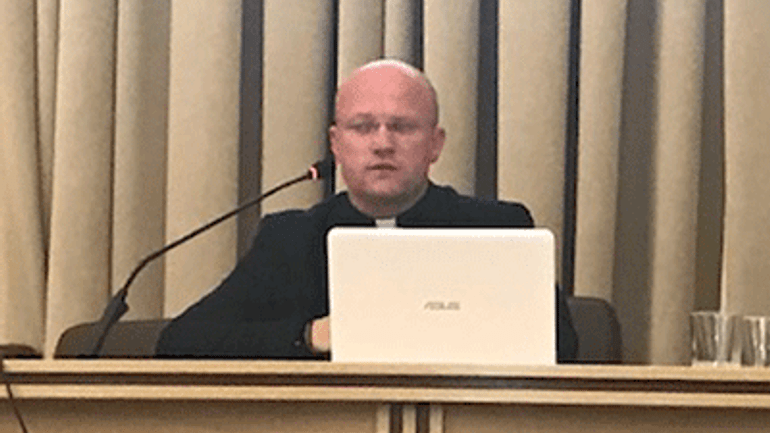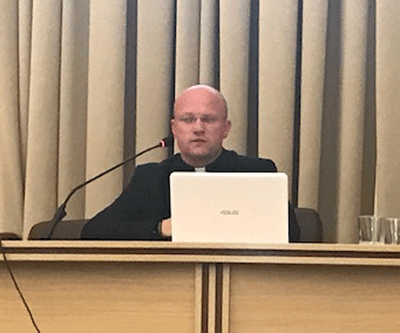Ukraine receives new experience - military chaplaincy – as a result of Russian aggression in Ukraine, UGCC Fr Stepan Sus

As part of the Colloquium of European parishes -- which brought together 120 active priests and laity to Lviv -- a unique pastoral experience of military chaplaincy in Ukraine that resists Russian aggression for the fifth consecutive year, was presented.
The chief military chaplain of Lviv Archdiocese of the Ukrainian Greek Catholic Church, the rector of the garrison Church of Sts Peter and Paul, a priest whose heart and temple are open to all, Fr Stepan Sus, told us about his experience of staying on the front line with the guys in the trenches, what you feel when you look into the eyes of death and save souls in the war, how to choose consolatory words for the mother who had just lost her son and how to treat the wounds of those who returned from the front.

It was this priest who in 2008 opened the garrison Church of the Holy Apostles Peter and Paul in Lviv, where at that time there were shelves with three million books, and today it is a temple that bids farewell to the deceased defenders of Ukraine. Over the five years of war with Russia, 93 funerals of heroes of Ukraine were held here.
"The war came into our lives, the war, which we read about in books, became close to us. It affected every Ukrainian family, left scars on the hearts of many," says Fr. Stepan.
According to him, being a chaplain first of all involves being a man, a priest, a friend, a brother, a father. Chaplaincy requires commitment from the priest. The motto of the chaplaincy is the word "always by your side" – despite religious beliefs. It is important that the soldiers, having different views on God, still know that in their military unit there are military chaplains, to whom they can turn at any time.
"Always by your side" – next to the soldiers on the front line, in hospitals, in psychological rehabilitation, next to mothers who lost a son or daughter in the war, next to those who need not only psychological but also material assistance."
"We combine chaplaincy and pastoral care in the garrison church. We take care of families of service people who died in combat or went missing, were wounded or suffered serious mental injuries. In Lviv, at the Lychakiv cemetery, we hold a joint prayer with the families of the military who died in combat, every last Saturday of the month. We must be aware that war is also life. We move on, we walk on the streets, minding our own business. We do not stop, to think that "somewhere the war is ongoing". But it's not out there, it's here... And even when we drink coffee, get married, baptize children, go through a funeral. A thousand kilometers away, our guys are involved in combat action. And here life continues. All this is reflected in the life of the Church. It received a totally new experience. It's hard to believe, but during one day the garrison church may hold 3 funerals and weddings – this is our tough Ukrainian reality today," Fr Stepan explains to Europeans that Ukrainians have learned to get along with the war, it has become commonplace.
"The temple is a place where everyone should feel that God is near, it is not only a place to pray, it is also a place for moral support and social services," says the priest.
He recalled difficult moments when he had to tell a mother about the death of her only son two years ago. The tragedy was exacerbated by the fact that their father left: "I could not find a word of comfort. I contacted the father and he decided to return to the family, because the grief for two is grief divided by two. Later, they decided to adopt a child from the orphanage. because for three years they felt how much God loves them."
Fr Stepan Sus told how the garrison temple hosts every last Saturday of the month the assemblies for the families who lost relatives in the war in the East of Ukraine or whose relatives are in captivity or went missing. In the temple, they work with those who need psychological rehabilitation.
He also talked about how Ukrainians are capable of forgiving their enemies. Even a mother or a father, having lost their son, are trying to forgive someone who became a murderer – that's the highest expression of forgiveness.
He also talked about the military realities of the 21st century, when in the last minutes of his life a wounded soldier wrote Fr Sus his last SMS.
Fr Stepan explained that he teaches the military how not to lose face and dignity: "Yes, this is war, but the military should behave with dignity because it is the defense of their land. We did not come to a foreign territory, but the enemy did, they brought us this war and we need to adequately defend our land. Every war is aggression, although we did not start it, but our mission is to stop it."









